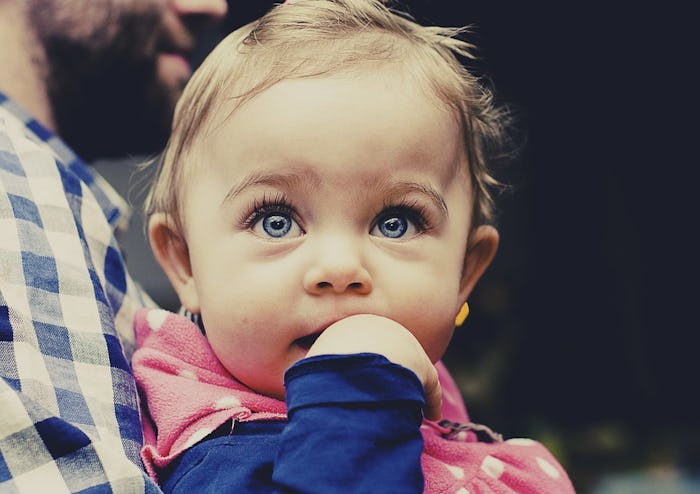One of the most anticipated milestones for parents is hearing baby say their first word. Part of the joy come from the surprise factor — you never know what they're going to say or when they're going to say it. But, as with any milestone, every baby is different. Some say their first word well before the one-year mark, while others wait a few months past their first year to start talking. For those with babies who haven't started talking before their first birthday, you may find yourself wondering, "Is it OK if my baby is 12 months and not talking?" Although, it is fairly common that babies wait past 12 months to talk, it's not always a cut and dry, yes or no answer.
There's a fairly vast timeline for the average age when babies say their first word, start using infliction in their voice, and begin piecing together phrases or sentences. According to Baby Center's timeline, at 12 months old most babies say their first word or know a small amount of words well enough to use them. By 14 months, many babies will start to use inflection or gestures with their speech, and by 16 months, your little ones are generally talking to someone (or something) more so than just randomly babbling at nothing. Anywhere between 18 and 24 months, babies will acquire a vocabulary between 10 to 20 words and begin putting small, primarily two-word phrases together. This timeline, however, is an average, and it's important to keep in mind that no one individual progresses at the same rate as another.
If your baby has passed 12 months and hasn't spoken yet, there's no reason to be alarmed. Parents noted that, typically, "a late-talking child will catch up with her peers" But, as developmental behavioral pediatrician Dr. Marilyn Agin told the publication, that doesn't necessarily mean you have to take a "wait-and-see" approach either. If by 16 months old, your child still hasn't said her first words then it's time to bring up your concern with your pediatrician.
Agin suggested that the key to language disorders and speech difficulty is early prevention. And you, as mom or dad, know your child better than anyone else. If you're concerned or feel that your child's speech progression is much further off than it should be, look into local speech pathologists or neurodevelopmental pediatricians to figure out how to move forward.
Again, do keep in mind that there's no real reason to feel behind or concerned just yet if your baby doesn't talk at 12 months old. The bigger concern, according to New Health Advisor, is if your baby doesn't make babble noises by 9 months, can't express wants through body language by 12 months, or hasn't said any words by 16 months. And even then, there's often nothing serious going on. It's simply just a good idea to take an early intervention route and utilize some outside sources and tools to ensure the best developmental speech process.
If you want to take advantage of new ideas to encourage your baby to talk, Health Advisor suggested trying to talk them through tasks you're performing, reading books out-loud often, or imitating the sounds your baby makes. As the parent or caregiver, you know your child best. And if you feel there's reason to be concerned, check American Speech-Language-Hearing Association child development charts. If you still find reason to be worried, most states provide evaluations at no cost, which can allow you peace of mind if it's simply developmental or offer huge benefits with early speech therapy if there's a bigger issue.
